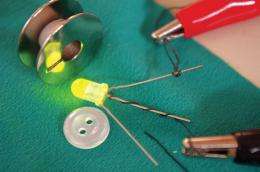December 30, 2011 report
Cotton computing goes live at Cornell textiles lab

(PhysOrg.com) -- Researchers from France, Italy and the United States are weaving cotton with transistors for a new look in computing. Based on news about a lab at Cornell University, wearable computing is getting a new twist. Transistors made from cotton fibers are being explored at the Textiles Nanotechnology Laboratory at Cornell for use as clothing to collect, monitor and relay information.
Envisioned end uses could take form as clothes measuring pollutants, firefighters' uniforms detecting dangerous chemicals, T-shirts displaying information, medical purposed garments monitoring heart rates and perspiration, as well as carpets in commercial environments measuring allergens or humidity.
The group has come up with transistors made from cotton fibers. They use an approach that departs from the practice of attaching sensors or processors to fully formed garments.
Instead, they are incorporating their information-retrieving devices directly into the fabric. The Textiles Nanotechnology Laboratory focus is on merging textile science with the emerging area of nanoscale science.
In their work to make the fibers conductive, the team coated each strand with gold nanoparticles and with an additional thin layer of PEDOT, poly(3,4-ethylenedioxythiophene), a conductive polymer.
The fibers proved to be about one thousand times as conductive as plain cotton, and had slightly stiffer but more elastic qualities than untreated fibers, said reports.
The team demonstrated the cotton's conductivity by making a simple circuit; they knotted one end to a battery and the other to a light emitting diode (LED).
Overall, said Annalisa Bonfiglio, a professor in the department of electrical and electronic engineering, University of Cagliari, Italy, whose student Giorgio Mattana worked on the cotton at the Ithaca lab, treating the cotton with these various substances is not very complicated, comparable to dyeing materials.
For the immediate future, she added, the most realistic application of their research may be for use as wearable sensors.
Juan Hinestroza, director of the Textiles lab at Cornell, said “pretty decent computing power” can be the result if one considers how many fibers in a T-shirt, for example, and how many interconnections there are between the weft and warp of the fabric.
His work has not gone unnoticed by those seeing potential in new ways to integrate electronics with traditional textiles. Hinestroza has received funding from federal and state agencies as well as industrial consortiums for his explorations in how to create multifunctional fibers using nanoscale phenomena.
While wearable sensors is the most practical near-term application, the more distant future (or perhaps back to the future) might extend elsewhere. Earlier this year, Hinestroza said, “Perhaps one day we can even build computers out of cotton fibers in a similar way as khipus -a recording device based on knots and used by the Inca empire in Peru.”
More information: Organic electronics on natural cotton fibres, Organic Electronics, Volume 12, Issue 12, December 2011, Pages 2033-2039.
Abstract
Nanoscale modification of natural cotton fibres with conformal coatings of gold nanoparticles, deposition of thin layers of the conductive polymer poly(3,4-ethylenedioxithiophene) (PEDOT) and a combination of these two processes were employed to increase conductivity of plain cotton yarns. This innovative approach was especially designed to fabricate two classes of devices: passive devices such as resistors obtained from electrically conductive cotton yarns, and two types of active devices, namely organic electrochemical transistors (OECTs) and organic field effect transistors (OFETs). The detailed electrical and mechanical analysis we performed on treated cotton yarns revealed that they can be used as conductors still maintaining a good flexibility. This study opens an avenue for real integration between organic electronics and traditional textile technology and materials.
© 2011 PhysOrg.com


















